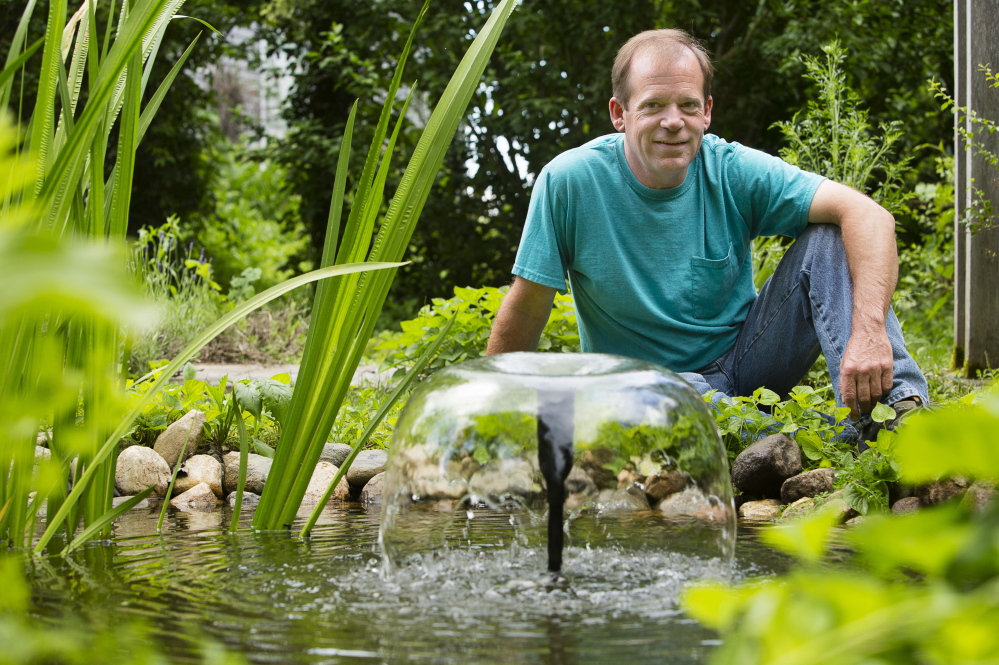With summer upon us, but Maine ocean waters still a little too chilly for most, our thoughts turn to the promise of the warmer waters of swimming pools. We called up Chris Paquette of Robin’s Nest Aquatics in Hollis to talk about ways to build more sustainable pools, ones that operate without chemicals.
He builds “natural” swimming pools – we asked him to explain that, since if he builds it, clearly it did not spring forth from nature. He’s working with technology that can convert traditional swimming pools into greener waters as well. We also talked pricing and the plight of frogs.
BACK STORY: Paquette founded the company with his wife, Terri, whose background in therapeutic recreation inspired an interest in the healing powers of water exercise. He’s a veteran of the Vermont Air National Guard and spent more than a decade working on energy management projects. That’s where he picked up his expertise in hydraulics.
He started by looking at a book by landscape designer Michael Littlewood of “pretty pictures of constructed natural pools.” Meaning, Paquette says, pools that work with nature, staying clean with zooplankton and special plantings that attract beneficial creatures.
There weren’t a lot of practical instructions in the book he read, so “long story short, I had to make it up.” Good thing he’s “an engineering type person.”
MOTIVATOR: This unusual career track – he believes Robin’s Nest is the only Maine company building these pools – opened up a path to not just job security (he’s built “a couple of dozen” pools, and many garden ponds and other water treatments) but happiness. “I can do what I like, which is to be outside.”
COUNTER-ACTION: He watches areas that nature intended to be wetlands being developed and hopes that his work can counter those losses.
“I want to replace lost habitat,” he said. “I am quite clear about that. You know, frogs are going to be like the bees – they are already struggling.”
So the natural pools would include some critters? Definitely, he said. Frogs and butterflies and bees and insects are part of the ecosystem, and they help the natural pools run smoothly.
EXPLAIN PLEASE: “Think of a marsh,” Paquette said. “Mother Nature has designed that marsh to collect sediment from upland and clean it up before it gets to the ocean. It doesn’t always look that way but it does.” That’s his model, creating a healthy environment with layers of stone materials, sand and a combination of plants that consume the nutrients that contribute to algae growth.
His pools usually involve a dug-from-scratch hole, but he’s also working with filtration systems that allow him to retrofit traditional swimming pools into “living pools.”
TONY CLIENTELE: Paquette has built swimming pools for Mainers, as well as for customers in New Hampshire and Vermont. His customers include a pair of well-known writers up in the Blue Hill area. And they better be well-known because the pools aren’t cheap. “I could probably squeeze one in for $35,000,” he said. But the average cost is much higher. “Typically it runs about $65,000.” And a time commitment on both ends; it takes about three years and many regular checkups for the system to become self-sufficient.
POOLS WITH BENEFITS: The natural pools don’t have to be drained in the winter, in fact, they have a dual purpose since once they freeze, they can be used as ice rinks. “That’s the fun of it,” Paquette said. His ideal aesthetic is: “You walk up to it and you can’t tell, ‘Did somebody build this? Or was it here and they built the house next to it?’ ”
DREAM BIG: What he’d really like to do is move into more public-sector pools. The natural swimming pool doesn’t have to be limited to backyards, he argues. Why not have a community pool that operates without chemicals? “I am an environmentalist in case you haven’t noticed,” he said. But the trick is in persuading communities that his systems really do work. He hopes a new partnership with the European-based natural pool company Biotop, which he says has done innovative new work with filtering systems, will help him improve and expand the business.
GETTING THE WORD OUT: The Paquettes don’t bother with advertising; they just hit the Portland Flower Show, bringing along various burbling displays. No, not pools, those displays are smaller water features. “Because water is just fun and cool. If you do it right, it turns people on.”
The Children’s Museum & Theatre of Maine features a Robin’s Nest installation in its new “Down to the Sea: An Outdoor Adventure” exhibit, which is based on the Chris Van Dusen book “Down to the Sea with Mr. Magee” and includes a mini “sea.”
Paquette was headed to Portland to check on Mr. Magee’s sea when we talked on the phone, having just left the site of a proposed project in Harpswell for a 125-foot natural swimming pool. He sounded giddy about the latter.
“It’s going to have frogs and tadpoles and dragonflies,” he said. “But what they won’t have is mosquitoes, because the water is moving, always moving. These are about the cleanest-looking ponds you’ve ever swum in. The water is drinkable.” Marco. Polo.
Send questions/comments to the editors.




Success. Please wait for the page to reload. If the page does not reload within 5 seconds, please refresh the page.
Enter your email and password to access comments.
Hi, to comment on stories you must . This profile is in addition to your subscription and website login.
Already have a commenting profile? .
Invalid username/password.
Please check your email to confirm and complete your registration.
Only subscribers are eligible to post comments. Please subscribe or login first for digital access. Here’s why.
Use the form below to reset your password. When you've submitted your account email, we will send an email with a reset code.